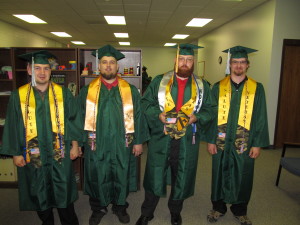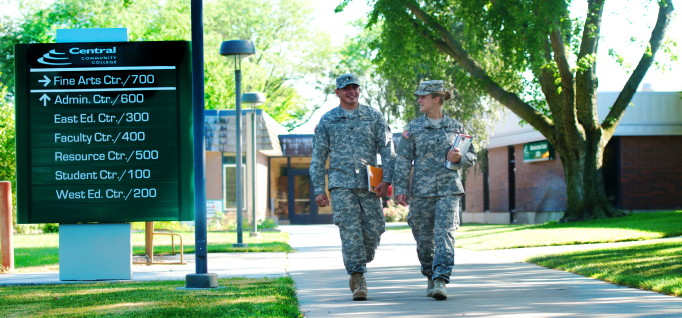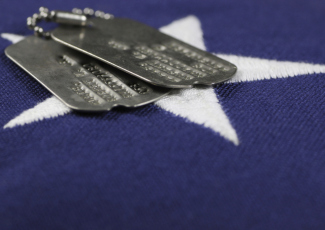Giving Veterans the Tools They Need
By Sonya Stinson
February 25, 2016
In Nebraska, one college created a program to support former military members and ultimately shifted the college’s culture.
At Central Community College (CCC), in Nebraska, everyone from top administrators to maintenance staff is required to participate in a professional development program to support student veterans. Called GRADES — Guiding Reintegration and Directing Educational Success for Veterans and Military Students through Faculty and Staff Professional Development — the program earned the college a Bellwether Award at the Community College Futures Assembly, in January.
Including all personnel in the training has been critical to the program’s success, says Travis Karr, veteran and military services director at CCC. Karr recalls a particular incident that shows the powerful impact of having all faculty and staff attuned to the special challenges veteran students encounter.
“One of our janitorial staff dropped a bucket from a shelf, and it hit the floor and made this huge boom,” Karr says. “He looked outside in the hallway, and there was this student who was just frozen and shaking.”
Having completed the GRADES training, the janitor suspected that the student might be a veteran exhibiting symptoms of post-traumatic stress. After speaking to him calmly and finding out the student was indeed a veteran, the janitor walked with the student to the veterans resource center on campus, where he was able to access counseling and other types of assistance he hadn’t known about.
“What we’ve seen in the past is that that veteran would have dropped out,” Karr says. “He would have never shown up again.”
 Cultural shift leads to completion
Cultural shift leads to completion
The GRADES program has created a cultural shift at CCC, Karr says. Now veteran student success is no longer just the responsibility of the veteran services coordinator or the resource center — it’s a mission of the entire college.
By many accounts, the college has made remarkable advancements toward fulfilling that mission. Before the start of the GRADES program, the school did a survey of veterans to find out how they perceived CCC. In 2011, only 21.7 percent said the school was veteran-friendly. By 2014, that number had soared to 85 percent, Karr says. Persistence and graduation rates increased from 47 percent to 76 percent, while completion rates doubled from 31 percent to 62 percent.
The college’s overall veteran student support program was funded by a three-year grant totaling $399,000, awarded in 2011 by the U.S. Department of Education’s Center of Excellence for Veteran Student Success. Karr developed GRADES through a partnership with Lori Wardlow, director of the local Veterans Administration health care system. He says the costs of that program, mainly for travel to promote and share the ideas with other colleges and universities, are covered under CCC’s annual operational budget.
“These costs are very minimal and allow other institutions to introduce a cultural impact on their campuses without major funding or a grant,” Karr says.
Leaders make veterans’ needs a priority
One of the most important elements of the GRADES training is having a panel of student veterans provide firsthand accounts of some of the issues affecting veterans. Their input has helped faculty and staff members understand just how daunting the transition from the military world to the academic world can be. As a result, instructors are more sympathetic when a veteran has to miss class to go to a VA hospital appointment, knowing how hard it can be to schedule those visits. And one instructor was accommodating when a student needed to stand up from her seat every 10 minutes or so during class in order to relieve her chronic back pain.
CCC leadership strongly supports making veteran student needs a priority, especially since CCC’s president, Greg Smith, and Grand Island campus president Thomas Walker are veterans.
“What we’ve seen at Central Community College is that these are some of our most outstanding leaders,” Walker says. “They are trained with leadership skills that some people will pay for in executive-leadership programs, and they bring that to our campus, so empowering those students is important. And we’ve benefited from that empowerment, because it really helped give the college a feather in its cap.”
Photos courtesy of Central Community College






